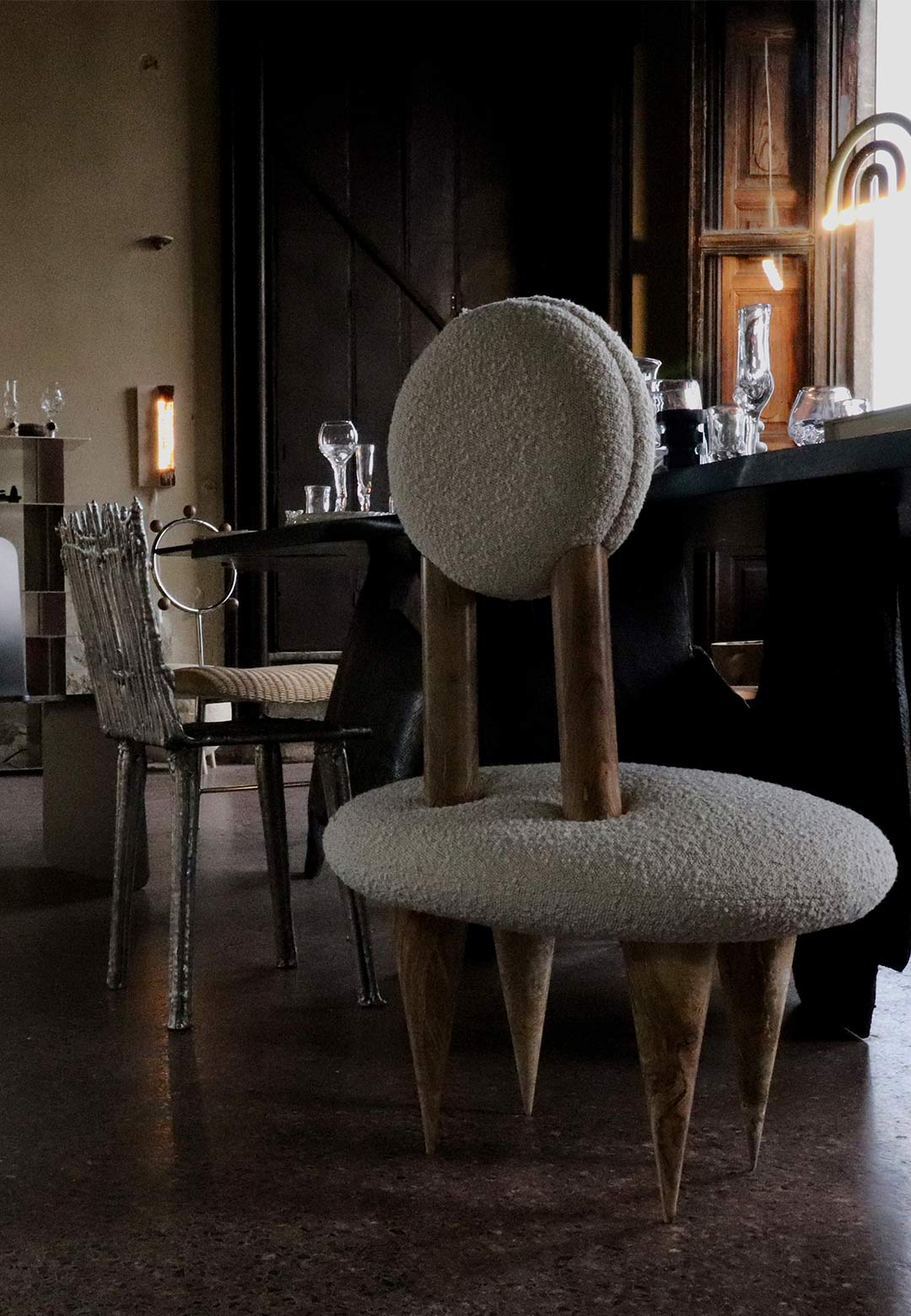Retracing the childish wonder of ‘what if furniture could speak’, the designers showcasing at Milan Design Week's Animism immersed the visitors into a journey where each piece of furniture design morphed into a storyteller. Transcending beyond the physicality of the curved form or the unique texture of the objects, the design exhibition by Adorno invited visitors to emotionally resonate with the underlying spirit and story of each piece. The exhibition design unfolded around a banquet with eight chairs around a dining table adorned with an assortment of statement pieces from bespoke cutlery to hand-blown glassware. Set in the poignant historic Villa Bagatti Valsecchi, Animism served as a thought-provoking spiritual retreat at the Alcova Milan 2024. Elucidating the intent of the exhibit, Martin Clausen, the Co-founder and Creative Director of Adorno says, “By forming a deeper bond with the objects that inhabit our lives, we foster a sense of stewardship and care, paving the way for a future where our material choices are guided by connection rather than consumption.”
Helping create a space for independent curators and artists to exhibit their masterpieces, Adorno was established in 2019 in Copenhagen as an online gallery. Working with virtual as well as physical exhibitions, they currently operate in over 50 countries. Celebrating art, crafts, and design, Adorno aims at cultural relevance, experimental design, and exceptional materiality. Focusing on a wide variety of sculpturing furniture to functional art, the exhibitions are region and culture-specific. Offering ample amount of exposure for growth and unfiltered promotion for relevant work, the exhibitions provide a platform for autonomous and upcoming designers.
Conforming to Adorno’s ethos, Animism explored the futuristic aspect of design through materials, sustainability, and spiritual engagement. Furthermore, the exhibition had an imminent lineup of artists, product designers and furniture designers, all sharing a common notion of a latent relationship between the physical and the spiritual realm. Each piece is personified owing to human attributes injected into it: vases wearing jewellery, thoughtful mirrors reflecting, humble tapestries, lamp designs and cabinets singing and dancing silently—a simmering dialogue transcending materials, colours and cultures. The setting invited visitors to engage with the exhibits on a human level—almost as if befriending them.
From eminent names like Nicolas Erauw, and Jacob Egeberg to emerging creatives, Adorno laid bare an interesting lineup, all serving a common purpose of evoking a narrative and providing a visual delight. One of the interesting product designs from the repository was the Dig In series by Lilli Malou Weinhold. Inspired by hand jewellery design and serving the purpose of cutlery, the Dig In series evokes an immersive playful dialogue. “The production of the objects was a large focus of my work, as I wanted to gain insight into the craft of gold and silversmithing,” describes Weinhold. She also wanted to explore the narrative of how the culture behind table etiquette has evolved in Europe over centuries.
Monolith, a stainless-steel floor sculpture by Nitush and Aroosh is another interesting take on contemporary sculptural furniture. Influenced by the rich tapestry of Indian metal craftsmanship, this brother duo uses hydroforming techniques to mould the metal into abstract forms. Although traditional crafts inspire their concept, the process of developing their product defies conventional beauty and functionality. By avoiding casting processes for their production and using environment friendly techniques, the duo preaches sustainability in their production process.
Aleksandra Zawistowska and her team's hand-blown glass collection exuded the philosophy of finding ‘perfection in imperfection’. The natural irregularities make each piece of the collection embrace individuality and uniqueness while the overarching idea behind the collection is deconstructive artistry. Studio MOTO’s exhibit Stack is an interesting take on modular storage fittings which involves no screws or fixings. Developed in Belgium, this modular design is flexible and can have innumerable variations and combinations.
Animism also staged Dark Mode, a dimensional dive jacquard woven tapestry by Lucas Gutierrez Studio, 3 lost-wax cast aluminium chairs by Nicolas Erauw, and a crackled ceramic teapot by Adir Yakobi, to name a few. The exhibition emerged as an experience that evoked a spiritual nuance in the design realm. It helped the viewers understand the relevance of a metaphysical connection to the objects around them. Celebrating the notion of the ancestors giving lifelike importance to objects like rocks and even rivers, Animism treads back in time to evoke this sensory experience through contemporary design.
Stay tuned to STIR's coverage of Milan Design Week 2024 which showcases the best of exhibitions, studios, designers, installations, brands and events to look out for. Explore EuroCucina and all the design districts—Fuorisalone, 5vie Design Week, Isola Design Week, Brera Design District and Porta Venezia Design District.- Blown Glass
- Contemporary Design
- Design Event
- Design Exhibition
- Design Fair
- Design Festival
- Design Week
- Functional Art
- Furniture Design
- Furniture Designer
- Italy
- Lamp Design
- Lighting Design
- Lighting Designer
- Milan
- Milan Design Week
- Modular Design
- Product Design
- Product Designer
- Sculptural Design
- Sustainability
- Sustainable Design






 Sign in with email
Sign in with email










What do you think?